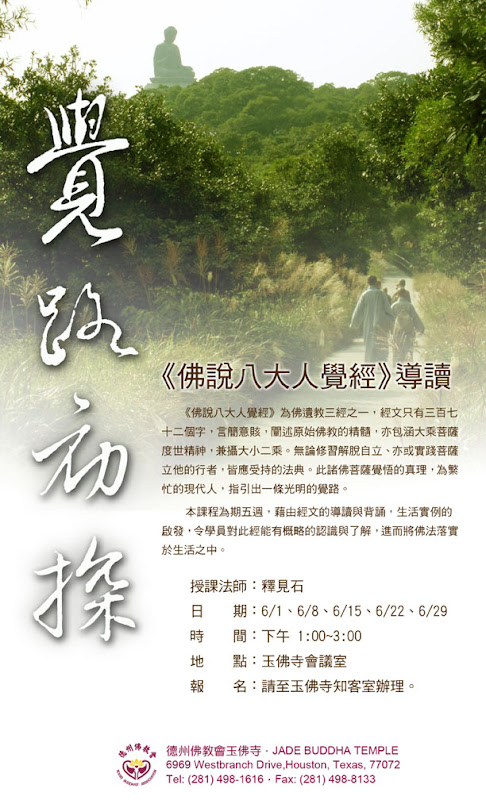 Mensa
Mensa is an international organization whose only membership requirement is a score in the top two percent of the general population on a standardized intelligence test. Such an interesting group has a Gulf Coast chapter in Houston. Each year, the
Gulf Coast Mensa holds a memorial weekend convention where “forward-thinking Mensans” get together to enjoy a weekend “filled with interesting speakers, games, dancing, good conversation, and fun.” Through contacts, they invited Master Jian Dan to give two talks at their annual convention, one aiming at adults about Buddhism and meditation, another aiming at children about meditation.
What can Master Jian Dan offer to this group of highly intelligent people who probably know more about many things than Master Jian Dan? “But I do know at least one thing you probably don’t. That is, today, I will teach you about nothingness.” The audience seemed intrigued by this statement.
“Many of you think it is easy to be a monk – you just do nothing all day long.” Master Jian Dan challenged the audience further, “you all are working very hard, running around between, work, family, children. Why don’t you try to do nothing, think nothing for a moment and see if it is easy.” Master asked the group to sit on the chair, close their eyes, and do nothing for three minutes.
Three minutes probably felt like an eternity. Audience shared that they cannot concentrate, kept thinking about something, kept hearing speaker from next room, etc. From here, Master directed the group into the essence of Buddhism and meditation.
Master introduced the mirror analogy as an example of how true mind should function. A mirror reflects all images in front of it without discrimination. If the surface of the mirror has dusts, a mirror will lose its function and unable to reflect things as they truly are. Our mind originally is like a mirror - clear, spontaneous and non-discriminating. This is a God giving quality that in Buddhism we called Buddha nature. When Sakyamuni Buddha reached enlightenment, he discovered this amazing phenomenon that “all sentient beings possess the same Buddha nature. It is only due to our delusions (wondering thoughts) and attachments, we are unable to attain Buddhahood (enlightment).” So the dusts on the mirrors are our wondering thoughts, past experiences, and attachments.
Master then gave an example of a dance recital. He was invited to attend a recital by a disciple. There were about 30 girls on the stage and the disciple was taking pictures the whole time. Afterward, Master saw the pictures in the camera but there was only one girl – the daughter of the disciple – also his attachment. Because Master was not attached to any single child, “I was able to see everything, therefore seeing the whole picture as it really was.” This example shows that when we have attachments, it is like the mirror with dusts, we can only see partially. However, when we are able to detach ourselves, therefore the clear mirror, we are able to observe the entire situation. Meditation helps us detect our attachments and train our mind to eradicate them.

Breath-counting method was introduced and a five-minute guided meditation was conducted. With the technique, audience found it easier to concentrate, even thought it was still difficult. Master reminded the group that training our mind to be strong enough to “shut down the background noise” requires routine practice. We are accustomed to allowing our thoughts wonder without knowing it. Thoughts are like seeds in the field. Without proper conditions, such as water and sun, the seeds will not be able to grow. When we follow our wondering thoughts, we give our thoughts energy. It is like the seeds that have received water and sun and now have grown into trees. If we continue to “give our wondering thoughts energy,” Master explained, “we will eventually imagine a garden with not only trees, but flowers, butterflies. We create the entire scenery and live in it. Eventually we live in this beautiful garden created in our mind.” This garden is our deluded mind, detached from reality and true situation. Meditation is the practice to have a strong mind so it does not wonder and got lost. Once we develop this ability to understand our thoughts better, we will be able to see things more clearly.

A longer meditation was conducted and audiences were eager to ask questions at the end. Master concluded the talk by referring back to the notion of “nothingness.” Master reminded us that when we reach that tranquility of mind where we are not attached to anything, the state of nothingness, we actually achieve the state of “all encompassing” as well. Nothingness needs to exist in order for somethingness to take place. As a matter of fact, eeverything arises from nothingness. When we open ourselves up for infinite potential, we work with nothingness to achieve somethingness. Ultimately, when we keep our mind in the state of perfect equanimity, our inherent wisdom will naturally arise.
 As one of the earlier translation of Chinese sutras, the Eight Great Awakenings Sutra has only 372 words and is one of the shortest and most concise Buddhist sutras. This sutra has been dedicated to lay followers before Buddha’s attainment of Nirvana. Many regard this Sutra to encompass Buddha’s fundamental teachings preached during his lifetime. It has similar characters as the Sutra of Forty-two Sections and the Testament Sutra, which are particularly sacred to monastic disciples. This sutra is entirely in accord with both the Mahayana and Theravada traditions where the texts address both the way to self realization as well as the path of Bodhisattva.
As one of the earlier translation of Chinese sutras, the Eight Great Awakenings Sutra has only 372 words and is one of the shortest and most concise Buddhist sutras. This sutra has been dedicated to lay followers before Buddha’s attainment of Nirvana. Many regard this Sutra to encompass Buddha’s fundamental teachings preached during his lifetime. It has similar characters as the Sutra of Forty-two Sections and the Testament Sutra, which are particularly sacred to monastic disciples. This sutra is entirely in accord with both the Mahayana and Theravada traditions where the texts address both the way to self realization as well as the path of Bodhisattva.


